
The Free Press

My favorite writer right now is a college dropout former hobo who hitchhiked the country before joining the Coast Guard and finding God. He has no permanent address, let alone a single byline in the legacy press.
I didnʼt think people like Andy Hickman existed anymore, in an age of so much. . . sameness. So much of the most celebrated writing is suffused with high irony, a deep familiarity with being online, and, at bottom, nihilism. But then there was Andy, writing monster Twitter threads about his wild adventures and some of the most original essays on the internet.
Then I saw that heʼd gotten married earlier this summer—to an equally fascinating woman who is the fourth generation in her family not to have a Social Security Number—and that, instead of a trip to Europe or a week at the beach, he and Keturah were gearing up for a yearlong trip across the United States for their honeymoon.
They planned to visit 12 small towns as a sort of mutual audition for America: did the country still have room for free spirits like theirs? And did they still have room for their country, which they worry is in decline, and quickly becoming, in Andy’s words, a “grimly conformist, tattletaling, coast-to-coast HOA.”
So I called up the newlyweds—me from The Free Press office in New York, them from outside of a public library in Madawaska, Maine—to see if they might want to write up their journey for The Free Press.
Today, I am proud to announce the series, Falling Back in Love with America. For the next year, Andy and Keturah will take us on a tour of the oft-forgotten corners of this country, from islands in Maine to Nevada deserts to the bayous of Louisiana and many places in between.
The election is coming up and don’t worry—we’ll have plenty of coverage on the candidates, their donors, their policies, and their chances of winning the White House. But we wanted to bring you another type of national coverage that didn’t center on the coasts, or super PACS, or the voting habits of suburban Philadelphia moms.
We are thrilled to publish Andy’s introductory essay below where he explains the project and introduces himself. Look out for new installments on their journey every month. And Happy Labor Day. —Suzy Weiss
But should auld acquaintance be forgot
Keep your eye on the Grand Old Flag.
—George M. Cohan, 1906
High on the road to Reno, hard-eyed and hungover, I stood. The dust was flying down the high hardpan plains in screaming wind-devils—but I hardly noticed. I hardly noticed anything anymore.
Bearded, greasy, and leaning against my filthy old rucksack out in the sand by the empty highway, I wasn’t the 25-year-old the high school guidance counselor might hold up as a portrait of success.
I was a vagabond, a hobo, a stone-broke drifter who’d been wandering all 48 of America’s contiguous states for the past five years. I was a college dropout. Precariously poor and occasionally penniless, I labored in fields harvesting melons and citrus with migrantes and bedded down in culverts and ditches. In all, I spent over a thousand nights outside camping illegally.
I ate garbage and drank liquor. I brawled in rail yards with the punks and hopped on freight trains with anarchists. I became an anarchist, too. I’d slipped out of the world of clocks and telephones and ambitions and became an oblation to a distant God or spirit, letting whatever volition I had in the hours and miles of my vagabonding dangle along the road behind me.
I carried no map. And if I ever kept my eye on the Grand Old Flag, it was with a leery eye.
But on that day in Nevada, something in me began to change.
It was there, somewhere along Interstate 80, where I raised my eyes along the highway, the Burger King sign glowing like a weird surrogate moon. I wondered at the billboard bearing the words: The Kingdom of Heaven is at hand: Call 855-FOR-TRUTH!
I thought of the Book of Ezekiel:
This is what the Sovereign Lord says to these bones: I will make breath enter you, and you will come to life. I will attach tendons to you and make flesh come upon you and cover you with skin; I will put breath in you, and you will come to life. . .
I thought of this scripture, although I hadn’t read it in years, because as far as I could ever tell in my years of hitchhiking, America was just a world of bones. Busted-down shacks and boarded-up gas stations; Vicodin-popping carpenters in rusty old Fords; fallow fields and broken oil rigs by sad, abandoned towns.
I’m from one of those towns. I grew up in the seldom-seen depths of upstate New York, in a tiny hamlet thatʼs closer to Canada than it is to Manhattan.
As a boy, it wasn’t hard to recognize that my village wasn’t the sort of place anyone was moving to. In fact, everyone was moving out—to Florida, or a Carolina, or some other sweltering hot, low-tax state.
Why they were leaving I didn’t yet know. With burdocks in our hair and blackberries in our bellies, us boys—me, my best friend, and my cousin—would crawl on hand and foot up the steep canyons along the river gorge, miles back in the woods. When we got hungry, we’d bike down to my aunt’s place for piles of grilled chicken and macaroni, sitting quietly by the fire as we heard the adults speak bitterly about “politics” and slugged Miller High Life.
When those same adults took to asking me “what I’d do,” now that I was becoming a man, it dawned on me that I’d probably leave, too. There weren’t any jobs worth having in our ragged old hamlet. In fact, there weren’t many jobs at all. Farms were going belly-up, and all the manufacturing had left the county a lifetime ago. And as far as I could tell, I wouldn’t want a job anyway. Anyone I knew who worked looked miserable, and if I ever pointed that out, my mother would say: “That’s why you’ve got to go to college.”
While I plodded through college a while, also in upstate New York, the old adage of “Go west, young man,” sat in my mind as an axiomatic truth. It didn’t take me long to drop out, grab a sleeping bag, and drift west. I had no real idea of what I might find out there—but I knew well enough that there wasn’t anything for me back home.
At the age of 19, I raised my thumb for the first time.
America spun in my head, and time began to pass strangely. My sojourn was indefinite and unconstrained. Five years passed, standing by the roadside.
I saw the country for what it was, watching my own hayseed innocence wither in a world of strip malls, strip clubs, and strip mines. I drifted through the depressed oil towns in Wyoming and rode freight trains by the clear-cuts of Washington State. I saw overdoses in New Orleans and hitchhiked my way into the cars of suicidal men in Utah and Ohio.
In time, a certain darkness crept up on me and locked me in.
For this was no country of Huckleberry Finn. It was a sprawling gigaplex of droning homogeneity, coast to coast; anything like the varied vibrance of the past seemed to have been paved over everywhere. And the souls of men and women seemed to have been paved over as well. Everywhere, a monoculture of profligacy flourished—feverish men gnawing for heroin and bottom-shelf liquor. Greyhound bus breakdowns and fickle cops and suicide hotline billboards and big neon signs advertising “GIRLS GIRLS GIRLS!” where Laura Ingalls Wilder’s own great-granddaughter was doubtless gyrating with dead eyes.
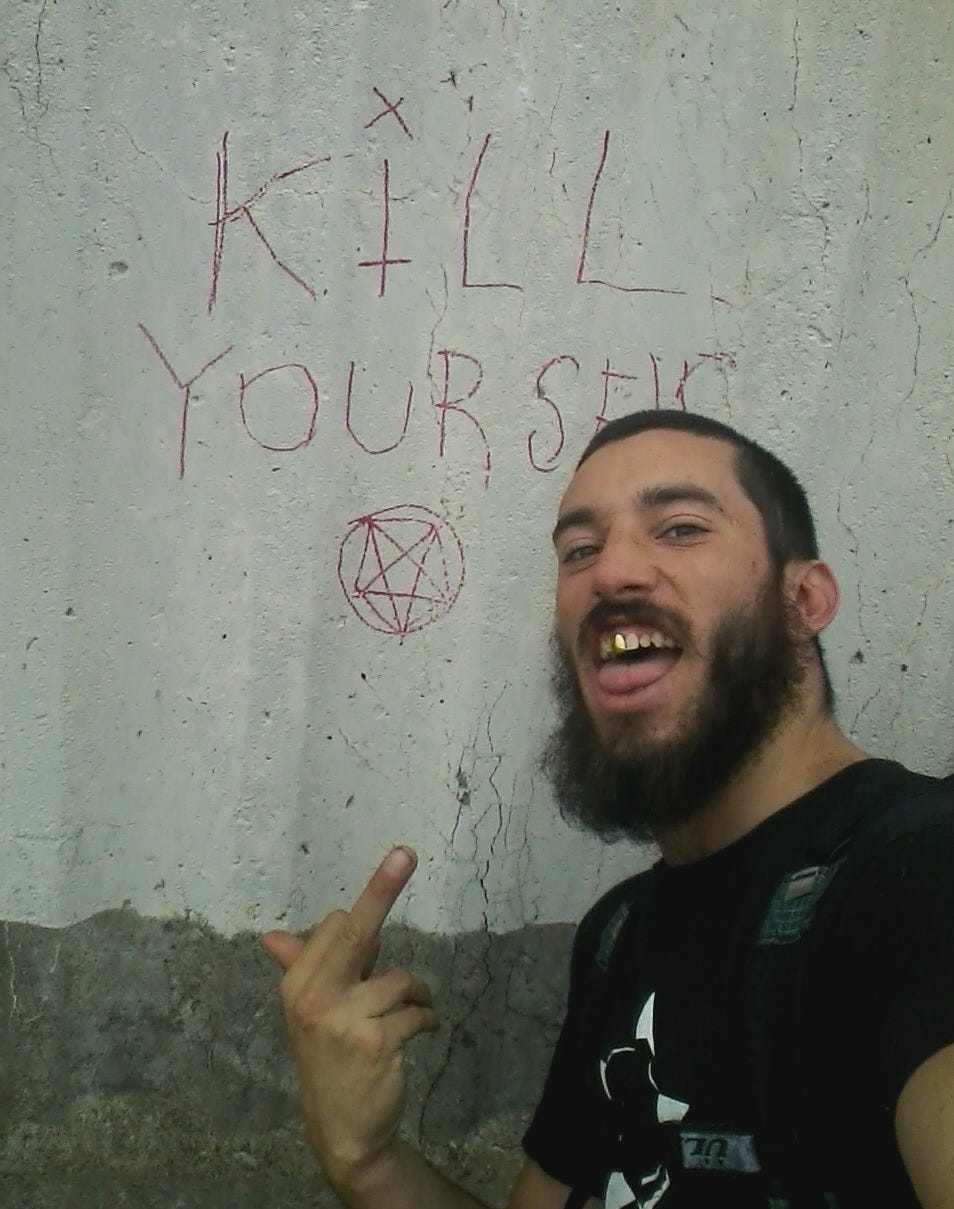
La Migra—immigration enforcement—would do their sweeps in the encampments a stone’s throw away from a world of antidepressants and tax debts. When the patriarchs of that world, gray-haired and divorced, picked me up, they’d mumble to me about “how things used to be” with sad eyes as we rolled in their SUVs by the miles of barbed wire and empty plain. Everywhere, a rattling juxtaposition between the gutter and Disneyland, between Dickensian ghetto scenes and Botoxed, green-lawn realms of bureaucracy and comfort.
As far as I could tell, somewhere along the line, “auld acquaintance” had indeed been “forgot.”
But just as I felt myself giving in—sinking deep into the idea that America’s demise had picked up unstoppable momentum—I would see the land. The white-capped mountains yawning to the heavens; the ocotillo’s fingers sneaking through a Sonoran Desert sandstorm; the Missouri River’s galloping current.
And there would be the people. People who understood such rousing visions not merely as “scenery” but as the simple truths around which they oriented their lives. Men with faces like the dry arroyos they dwelt upon; towheaded children inseparable from their “amber waves of grain”; Sioux aunties with sun-bleached Oldsmobiles.
Standing at the truck stop where the brake-pad dust mixed with exhaust in the breeze, where the shimmering heat rose from the high-speed asphalt, I stared up at that big Bible billboard and thought about bones. Not those in the Book of Ezekiel—I wasn’t religious back then. But about the bones of America and whether, like a solid old house I could only fantasize about, they were still good.
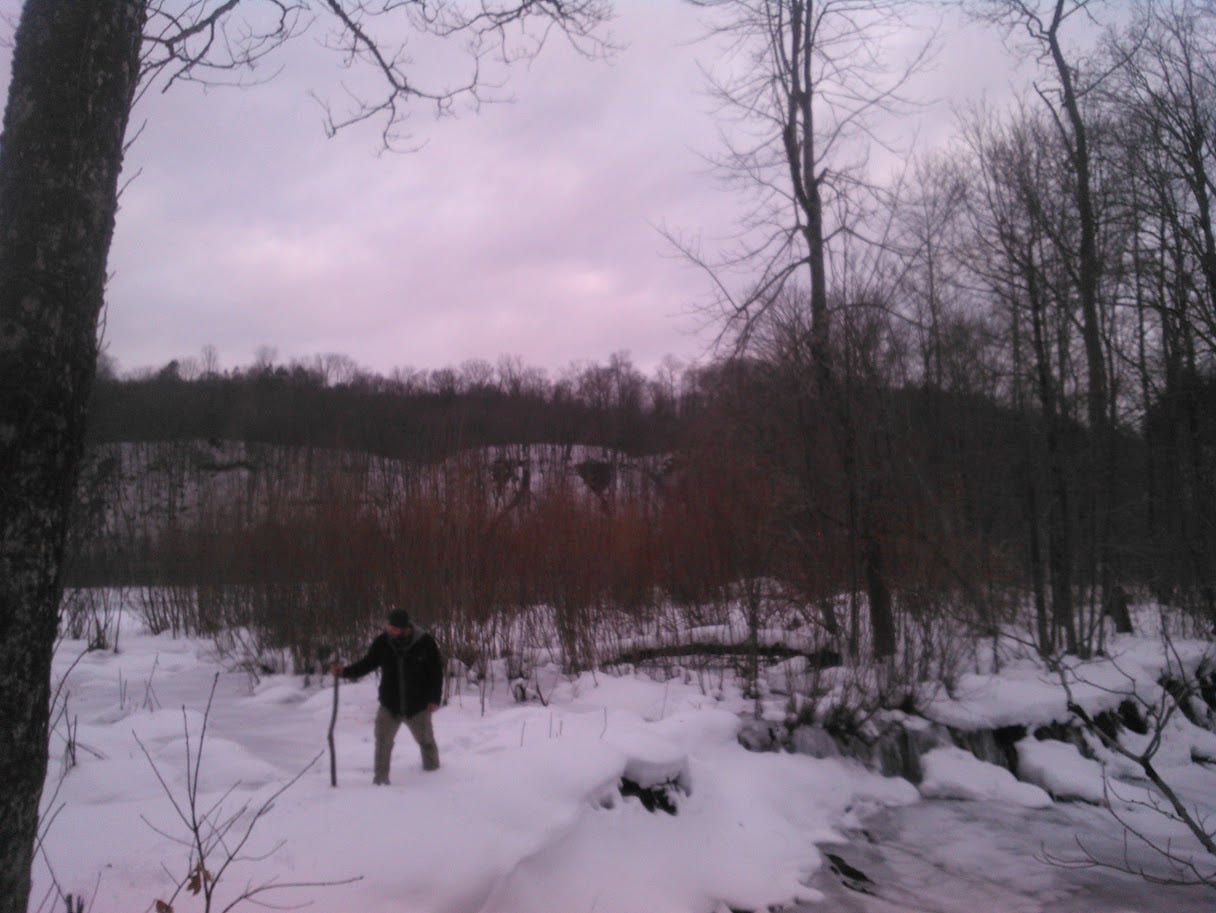
I signed on the dotted line at the Military Entrance Processing Station in Albany. I had thirteen cavities and seventeen cents to my name.
And in August 2019, at the age of 25, I raised my right hand to swear an oath to defend and uphold the Constitution of the United States, so help me God.
The forces that brought me to that room where the Grand Old Flag hung glistening were hard to understand, but that distant truck stop seemed to have something to do with it. Some weird and ineffable force implored me to contemplate the age-old choice of “love it or leave it”—and to ask whether I wouldn’t do well to try loving it for a while.
In time, I was given a uniform, taught the salute, and would find myself screaming the Coast Guard Ethos at boot camp graduation at the USCG Training Center in Cape May, New Jersey:
I am a Coast Guardsman. I serve the people of the United States. I will protect them. I will defend them. I will save them. I am their shield. For them, I am Semper Paratus. I live the Coast Guard Core Values. I am proud to be a Coast Guardsman: WE ARE THE UNITED STATES COAST GUARD!

I ironed my shirts, packed my seabag, and took my official U.S. Coast Guard military orders up to Michigan, where I’d been stationed aboard an ice-breaking tugboat. When I arrived, the captain sent me down to the engine room and put me in the care of a wizened old engineering officer who taught me to bring the engines back to life whenever they broke. “Keep them running, keep them clean, listen to them—and don’t sit around when they’re groaning or you’ll be real sorry you did.”
Maybe he wasn’t just talking about engines.
In between watches, I’d bundle up and waltz out on the deck in the open air where I could think clearly in the −45 degrees Fahrenheit wind-chill air under the Great Lakes skies. Stomach fluttering high above the furious waves of those inland seas, I thought about meaning and God and love. Although I’d grown up Catholic, I hadn’t been to Mass in well over a decade, and prayer was far from me. Yet I found myself praying, praying that the pain I’d seen might be plowed over and healed, praying that the dark gravity that my travels put on my heart might be arrested. I bathed myself in this supernatural hope, and it entered my blood like a tonic.
Darkness and revolution left me: Godless wandering died in my heart. Within a year, I’d be sent by the Coast Guard to Louisiana to work as a telephone technician, where I’d wander into a Catholic Latin Mass parish for the first time. Gazing up at the crucifix through the clouds of incense, I wept. I wept for His incredible love. King of the poor, Lord of the vagabonds—Jesus Christ, a traveler who’d endured a life of travails and scorn and heartbreak. He alone understood all I’d seen on the road. There at the Mass, I found all I’d ever sought in a life of heavy metal, punk-rock traveling—but it arced toward hope instead of the maddening pull of nothingness.
I loved my job. I loved God. And I wondered if I could find a woman to love, too.
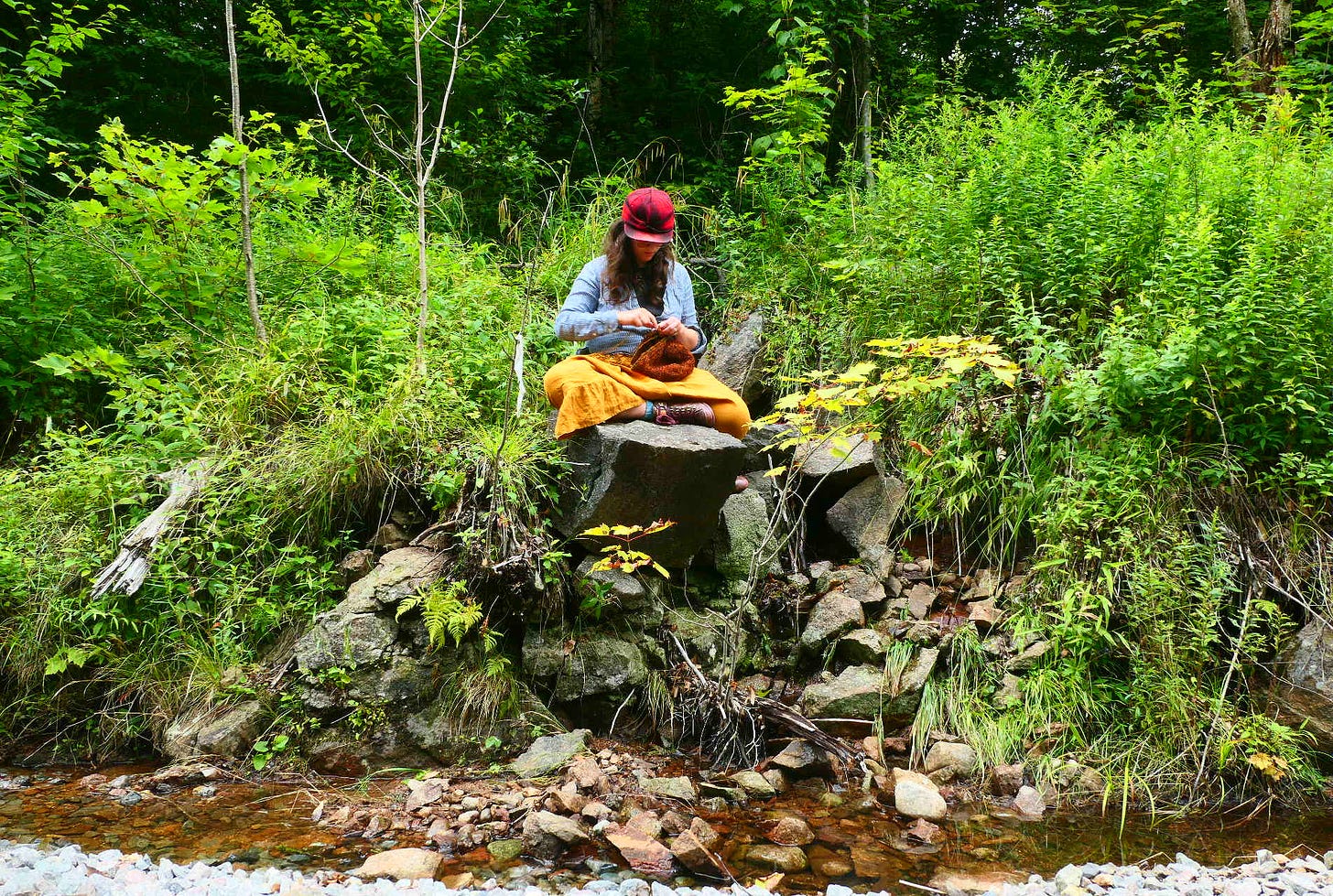
Toward the end of my service, I met her. It began with a telephone call, after a mutual friend introduced us, and then a letter, and then a volley of letters that had me sprinting daily to the mailbox.
Finally, she sent one containing the words, If you would like to come for a visit. . .
Straightaway, I packed the car for the 36-hour drive from upstate New York to Montana. At a truck stop in Ohio, I telephoned her father to ask his blessing—for this wasn’t a bout of dating, or a fling, but a proper courtship—and when he answered, I swear I heard him smile through the telephone.
“Well, we’re just some simple people, you know. I don’t mind if you want to get to know her,” he said. “I think you’ll like it here with us.”
Where my own family’s tenuous relationship with modern American ambitions and values had been largely accidental, and frosted with the inertia of intergenerational poverty, theirs was a family whose “opting out” had been deliberate from when they arrived in the seventeenth century. Where my own uncles might’ve rambled through their unemployed years with a half-baked thought of getting a job and some money—even if they never actually bothered—hers shunned the very idea of jobs and careers and wealth, rejecting modern American notions of “success” as a matter of principle. As I arrived at their family compound in the high Rocky Mountains of Montana, it felt as if I were traveling back into a more primitive and pure vision of our country. Theirs was a place where Johnny Appleseed himself would feel at home.
With 12 children, all homeschooled, my in-laws’ place was less like a family’s home and more like a small village populated with wild kids (both goats and children), bearded men of a devoutly religious persuasion, geese, cows, junkyards, mobile homes, buses, and sheds for sale—cash only.

The Lambs eschew credit cards, corporate jobs, Social Security numbers, and bank loans. Modern bureaucracies were remote to them. For four generations, they have resisted the new America of suburban sprawl, and the neurotic consumerism and bureaucracy of American life, since World War II. Their faith in America’s old ways has not wavered.
Keturah appeared in the doorway as a beauty in the mountain sunlight, dressed in a manner that makes you wonder whether she’s a hippie or whether she’s Amish. If you asked her which she was, she might’ve said: “Yes!”
Her world lay at the intersection between hard-core Rocky Mountain libertarianism, hand-sewn dresses, baked apple dumplings, and old-school, Old Testament faith. She’d lived with the Amish when she was a teen and could read the archaic German of Mennonite hymnals. She’d lived in Germany as an au pair and traveled throughout the United States alone in her station wagon. Frugal and elegant, literary and earthy, wrapped in linen and wool and the wildflowers of the Montana fields surrounding her home, she was a gem hidden high in the mountains. Nearly 12 months later, we’d take one another’s hands in marriage in a forest in upstate New York, surrounded by family and friends from all over the world—and plenty of wildflowers. It ended with her taking a hammer and smashing her phone.
In some regard, ours is the perfect American love story: I, the hobo sailor from the hinterlands of northern upstate New York, the beer-drinking backwoods Roman Catholic. Her, the daughter of Montana’s most successful Libertarian politician, a kosher-keeping, teetotaling Messianic Christian with a gypsy flair for rambling travel and handmade crafts.
As faithful Catholics who accept the church’s prohibition of birth control, we know God may bless us with a large family. Where could such a couple make a home?
We pondered immigrating to Mexico, where a friend of ours defected eight years ago. “It’s like America was in the 1950s,” he told us on the telephone. Far from the cartel nightmares depicted in the American news, he spoke of a land where neighbors don’t tattle on neighbors—a land without building codes and permits where people are kind and folks still go to church.
It sounded nice. We kicked around the idea of Argentina, too.
But I couldn’t help but remember that billboard and remember what I have felt deep in my own bones: the bones of America are good.
America, with every ounce of her old spirit, is my homeland. Such spirit cannot be invented; it cannot be manicured or forced. Legislate it, and it vanishes. Capture it, and it dies. Sell it, and it erodes unto oblivion. Those who’ve any ambitions to preserve this spirit must use a ginger and delicate hand in their efforts, for one cannot mow down the butterfly’s milkweed and expect him to remain lingering over the dead stalks. Some chase the spirit away, waving their hands and saying, “It was never here in the first place”—dismissing it as the products of duplicitous and empty nostalgia. But the bones remain.
I could not help but reflect on how thoroughly American Keturah and I are. What would be sacrificed by departing from our homeland? And what would our future family lose if we left?
So we decided to give America another chance. We will venture out and see whether it is plausible that we can indeed fall back in love with her once again.

We’re doing it the only way I know how: by train, bus, hitchhiking, bicycle, and foot. We plan to travel for a period of 12 months through this nation’s hinterlands—seeking out regions that constitute the richest expressions of both their local culture and of the American vision and spirit. Each town will be a small town, less than 5,000 people—the kind of place we can imagine one day raising children of our own.
In each town, we’ll stay on for a few weeks—observing life, frequenting churches and taverns, taking work when it is offered, and saying “Yes!” to invitations to see, learn, and do almost anything. We’ll camp in campgrounds, stay in cheap motels, crash in backyards, and rent efficiency apartments. We’ll take Greyhound buses and Amtrak trains and ride our folding bicycles around states like Nebraska and Louisiana. We’ll meet everyone we can.
Perhaps in doing so we might find a place to settle down. Perhaps it may convince us to return to upstate New York, to my family, or to Montana, to hers. Or perhaps, in the end, we will find that it is truly the time in history when two native-born children of the Stars and Stripes must pack their bags and set off—as our own ancestors once did, from Europe.
If we’re lucky, we’ll find some marrow. Places that are still viable, still cooking, still moving and breathing and living. High along the summits of Utah’s mountain ranges, at Dakota taverns and in arctic Alaskan havens or Adirondack shacks of birch bark–sleeping bone after sleeping bone, never dead at all but merely waiting.
For now: Keep your eye on the Grand Old Flag and see what she says to you. Perhaps every ounce of the America my wife and I are now seeking lilts above the pillars of your own front porch. Let us know if you find her.
Follow A.M. Hickman on X @shagbark_hick and on his newsletter, Hickman’s Hinterlands.
If you live in a small town, tell us where and why you think the couple should make it a stop on their tour in the comments section.
Falling Back in Love with America is made possible by our subscribers. If you’d like to support this project, and all of the work we do at The Free Press, consider becoming a paid subscriber:

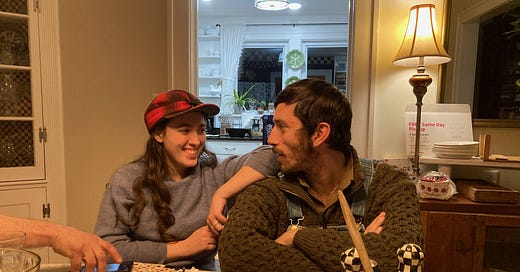





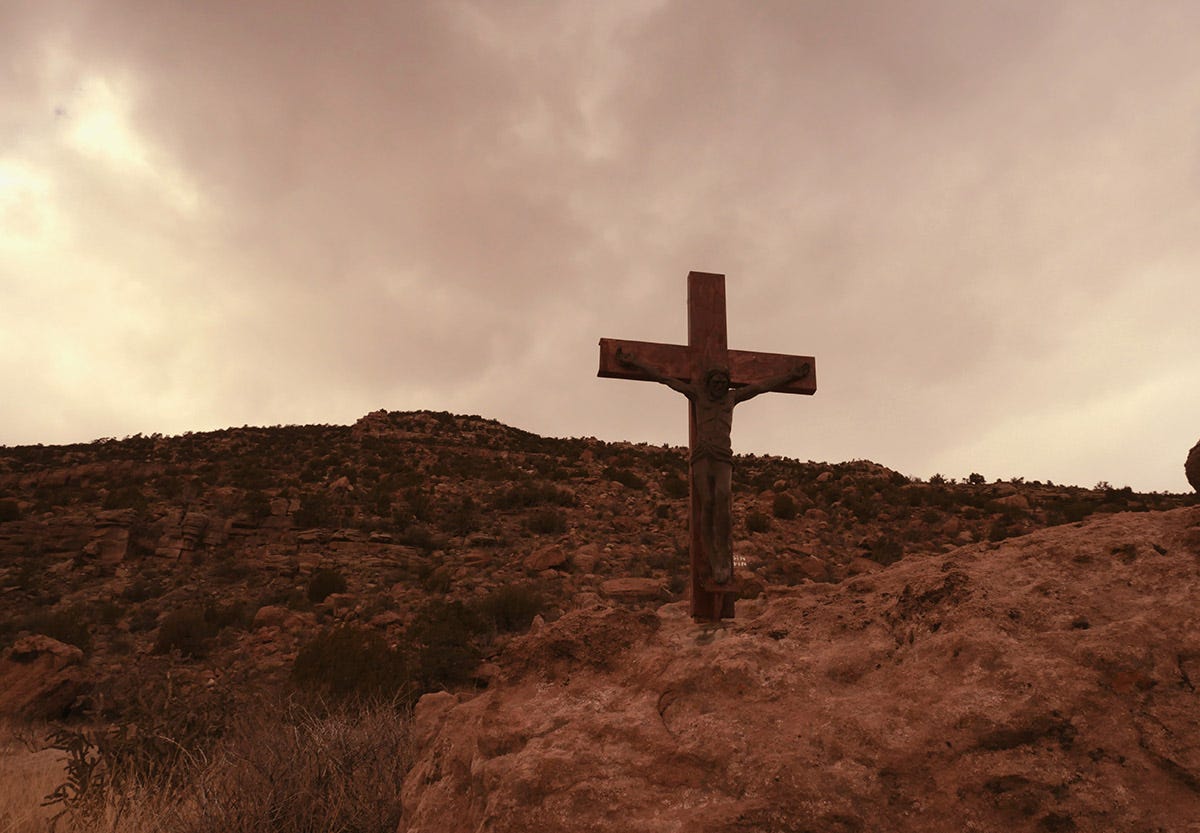

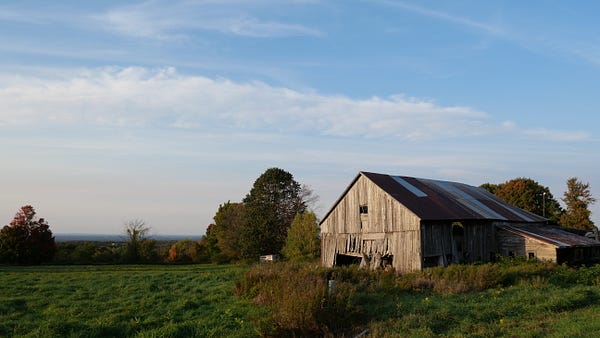

If you want to fall in love with America you should move overseas.
Re Andy Hickman's vagabond years (and also his upcoming explorations as half of a married couple): a quote from writer EB White - "There is a period near the beginning of every man's life when he has little to cling to except his unmanageable dream, little to support him except good health, and nowhere to go but all over the place." Here's to Andy and Keturah's dreams, their good health, and their journey all over the place.